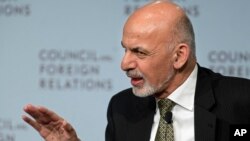Afghan President Ashraf Ghani’s visit to New Delhi was delayed a few hours Monday after heavy fighting broke out in the north of Afghanistan.
Hundreds of Taliban have attacked police and army checkposts in the northern province of Kunduz for the past three days and threaten to overrun parts of the provincial capital, local officials told Reuters.
Ghani postponed his planned departure and called NATO's General John Campbell to a meeting in Kabul to discuss the Kunduz fighting, the general told Reuters.
During Ghani's trip to the New Delhi, India is expected to reach out to the war-torn country’s new leader, who has been cementing links with Indian rivals Pakistan and China.
Although India had built considerable goodwill during the rule of Afghanistan’s former president, Hamid Karzai, Indian Prime Minister Narendra Modi will now meet an Afghan leader who has signaled new priorities by visiting Beijing and Islamabad before landing in New Delhi.
Some analysts said Kabul was disappointed with India for moving slowly on Afghanistan’s requests for military equipment and combat assistance during Karzai’s term.
India delivered three military helicopters to Kabul this month but did not give approval for a wider military shopping list, including items such as battle tanks.
Kabul’s new leadership is reported to have put that request on hold.
Relations with Pakistan
President Ghani has also led a dramatic turnaround in relations with Pakistan. That has led to some concern that India its losing influence in Afghanistan.
Manoj Joshi at New Delhi’s Observer Research Foundation said that is “inevitable” as Afghanistan needs Pakistan’s support for negotiations with Taliban insurgents.
“India has limitations in terms of geography that exist. The second thing is the fact that countries like the United States have probably decided at this juncture to try to persuade Pakistan to play a positive role. So India has I suppose taken a step back. But point is India’s role has always been limited in a sense," Joshi said.
Experts like Joshi, however, also say that fears India is being marginalized in Afghanistan are greatly exaggerated because New Delhi will continue its core role in rebuilding the country.
Over the last 15 years, India has spent $2 billion in building roads, highways, other transport links, schools and even the country’s parliament.
Sukh Deo Muni, a South Asia analyst at the Institute of Defense Studies and Analysis in New Delhi, said, "India has a role on the developmental front. India has a role in terms of strengthening the capabilities of the Afghan state by way of training their people, by whatever else it can do in terms of providing assistance," Muni said.
New Delhi could also announce measures such as more cooperation in training of Afghan defense forces.
Transit discussions
The two sides are also expected to discuss transit pacts that could boost trade.
New Delhi has signaled its willingness to join a bilateral transit agreement between Kabul and Islamabad that could connect India to Afghanistan via Pakistan, but its testy relations with Islamabad could be a hurdle.
Some material for this report came from Reuters.
New Delhi also hopes to finalize a deal with Tehran soon to develop Chabahar Port in southeastern Iran, which could give India vital access to landlocked Afghanistan and to Central Asia via Iran.
The game of cricket - a South Asian passion - could also figure in the talks.
The Afghan leader wants India to build the country an arena where Kabul can host cricket matches. Afghanistan is the latest country in which the game has become a national obsession.




